Peter MALONE
Jumanji: The Next Level
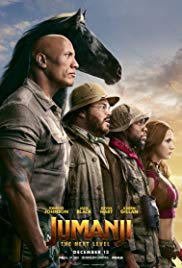
JUMANJI: THE NEXT LEVEL
US, 2019, 123 minutes, Colour.
Dwayne Johnson, Kevin Hart, Jack Black, Karen Gillan, Awkwafina, Danny De Vito, Danny Glover, Colin Hanks, Rory Mc Cann, Bebe Neuwirth, Alex Wolff, Nick Jonas, Rhys Darby..
Directed by Jake Kasdan.
Way back in the 90s, Robin Williams invited the audience to go with him into the board game, Jumanji. After 20 years or so, the filmmakers decided it was time for a return, led by Dwayne Johnson and Kevin Hart. It was a very popular success. So now, on to The Next Level – which seems remarkably like the previous level in terms of the landscapes of Jumanji, the need for rescues, the adventures and the difficulties, the resolutions.
However, with some tongue in cheek humour, the writers have moved to the next level in terms of which characters are in which avatars! Quite clearly, Dwayne Johnson has to be Dr Bravestone, the hero of the piece. There was always humour in Jack Black being the animal expert with Kevin Hart along for the dithering humour. And, Karen Gillnn, was the archetypal active leading lady. So, this time, why not mix them up? And, for further complication, Spencer’s grandfather, Danny DeVito? at his crotchety best, encountering his old partner in the restaurant business, Milo, Danny Glover, both of them caught up into the world of Jumanji. Which leads to quite a mixup – grandpa becomes a very crotchety Dr Bravestone. Ruby and the Professor get mixed up, Kevin Hart becomes Milo and, later, their friend Bethany arrives as a horse!
At one moment, the professor and Ruby revert to what we expect. But that is short-lived. The humour of this part of the film is added to by Dwayne Johnson having to imitate Danny De Vito’s voice. And, then when they discover Spencer in the form of an Asian warrior, Awkwafina, they all go on the adventures to rescue a jewel stolen by an ultra--Viking looking villain, Jurgen.
But, just as we wonder whether the group could achieve its mission, having been pursued by a huge flock of ostriches, being stranded in the desert, attacked by monkeys over a chasm with continually moving bridges, climbing mountains… The avatar roles are reversed and everything goes back to normal, Spencer is once again Dr Bravestone, Ruby and the professor are themselves as is Kevin Hart – but Awkwafiina is now grandpa’s avatar and then she has to imitate Danny De Vito’s voice while Milo becomes the horse.
So, plenty to occupy the mind in mythical adventures in Jumanji land, plenty of excitement in the confrontations and battles – and always with some humour.
1. The popularity of the series? The board game? The adventures? The myths? Rescues? The avatars?
2. The home setting, the house, the basement? Spencer and grandpa? Milo’s arrival and his story of the past? Spencer and his friends?
3. Spencer, with his grandpa, glum, his girlfriend, the members of the group, his return, setting up Jumanji?
4. The avatars, the previous incarnations, the contrast with this adventure, the mixups, the various changes, the final change and achievement? Performances, Dwayne Johnson and Awkwafina using Danny DeVito’s? voice? The characters, the board with the information about their characters, strengths and flaws?
5. The myths, Juergen and his beard, villainy, taking the jewell, his court, the plan, the brothers’ arrival, unmasked, their sister and the marriage?
6. The perpetual driver, the character from the board game, his explanations and repetitions? The mission?
7. The landscapes and their range, the desert, the ostrich chase, the chasms, the bridges, the monkeys, the mountains, the valleys? The town, the court? The imaginary land?
8. The various threats, the three bars for life possibilities, the deaths, into the sky, landing again?
9. The avatars? Dr Bravestone, grandpa as the worst Dr Bravestone? The transition to Dwayne Johnson? Ruby, the heroine, the fights, changing into Professor Oberon? Kevin Hart and his dithering as the professor? The return to Jack Black? Milo and grandpa being drawn into the game, the different avatars, Milo finally as the horse? The fights, the swinging bridges, the monkeys?
10. Alex and his story, his continual reappearance?
11. Awkwafina, her avatar, Spencer, grandpa?
12. The adventures, the capture, the rescues, climbing the cliffs, the horse with wings? The pretence about the brothers, Ruby and the marriage? The buildup to the confrontation, the fight, the space vehicle, Professor Bravestone controlling it? Juergen falling to his death?
13. Milo, the ability to fly, his decision to stay, his terminal illness?
14. The resolution, the return home, the talk amongst friends?
15. Grandpa, the new lease of life, going to the restaurant, the discussion with Nora?
Meeting Gorbachev
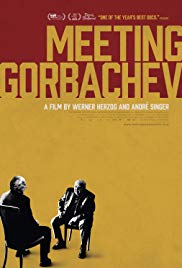
MEETING GORBACHEV
US/Germany, 2018, 95 minutes, Colour.
Directed by Werner Herzog.
At the time of the making of this documentary, Mikhail Gorbachev was turning 87. He had been in hospital, was diabetic (and receiving the gift of a sugarless chocolate birthday cake), was happy to be interviewed but, speaking only in Russian to Herzog’s questions in English, we see that he has slowed down a lot, taking his time to answer the questions, often being brief, but becoming more to life as the interview goes on and he is able to relive his time as president of the Soviet Union.
This is a portrait of Gorbachev himself, of his political activity and its repercussions on the whole world in the latter part of the 1980s and the dismantling of the Soviet Union. Herzog is quite an admirer (much more genial than might have been expected from some of his other documentaries). This is not a warts and all documentary. In fact, no warts at all to speak of.
While there were many in the Soviet Union, collapsing, in the early 1990s, Russians staging a coup against all of while he was on holidays, Boris Yeltsin taking over, who considered Gorbachev a traitor to his Communist and Soviet heritage, he was something of a hero to the world.
This portrait may be aimed at converting those who do not admire Gorbachev but it is definitely a documentary to remind those who do it by him of his achievements.
One of the advantages that Hertzog has is access to a whole range of visual sources, newsreel footage, photos… Which means that in his illustration of Gorbachev’s early life, born 1931, the landscapes of Russia, the fields and harvests, family photos, we are able to build up a picture of the young Gorbachev, working on the farm, going to school, high grades, acceptance at University in Moscow, some law studies, the interest in politics, his becoming a student leader, going back to the provinces as a local organiser, even receiving a medal of acknowledgement from Brezhnev (alarming footage of the old man, senile, wheeled out for public occasions).
We see very quickly, during the premierships of the elderly Andropov and Chernenko, that Gorbachev had a wider range of interests, visited the West, learned how the Soviet Union was stagnating and how it needed to reform, glasnost and perestroika, and then assuming power and ushering in a new era which, within six years, led to the end of the Soviet Union.
Gorbachev was quite a world figure during the last half of the 1980s and many audiences will be glad to be reminded of this. He was admired by Margaret Thatcher. He had dialogue meetings with Ronald Reagan in Iceland. He campaigned against nuclear weapons. The film includes testimony from the Hungarian Prime Minister of the time who opened up Gorbachev’s eyes to how small country could be prosperous, interviews with Reagan and Bush advisers, George Shultz and James Baker, German political advisers.
Then the visuals of citizens of the Baltic countries forming a continuous line of personal protest, of the cutting of the barbed wire on the Austrian border then, of course, the demolishing of the Berlin Wall.
So, admiration for corporate of and sharing his disappointment of how he was overturned by the coup, signed his resignation, lived to see a European world different from what he hoped for.
And, we realise that this is not the kind of world we live in now, regrettably so.
Bombshell/ 2019
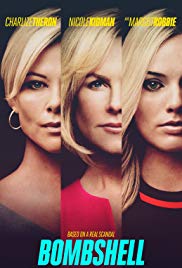
BOMBSHELL
US, 2019, 112 minutes, Colour.
Charlize Theron, Nicole Kidman, Margot Robbie, John Lithgow, Malcolm Mc Dowell, Alison Janney, Kate Mac Kinnon, Connie Britton, Liv Hewson, Mark Duplass, Stephen Root, Robin Weigert.
Directed by Jay Roach.
Audiences in the United States, especially those of Fox News, found this story more of a bombshell than audiences in other parts of the world who are not familiar with Fox News and not familiar with its founder and developer, Roger Ailes. Now, with this film and with the television series, The Loudest Voice, and with the momentum of the Me# Too movement, Roger Ailes has become one of the most prominent celebrity figures with his downfall.
Jay Roach has directed a number of films about contemporary American public issues, regional (Florida and the 2000 presidential election controversy), Game Change (Sarah Palin for VP), Trumbo (blacklisting in the 1950s), and now dramatises this expose of Ailes, his sexual harassment of his female staff, episodes of sexual exploitation, threats of court proceedings, the appeal to the boss of Fox and Fox News, Rupert Murdoch, Murdoch's putting the pressure on Ailes and his resignation. This certainly set a precedent for exposure of other sexual predators, especially in the media world, further scandals, revelations, court proceedings.
The exposure of Roger Ailes was the work of a number of women working in Fox News, anchors, reporters, staffers. Two women are credited with bringing down Ailes. One is a high-profile anchor, favoured by Ailes, Megyn Kelly, played with authority (but with some doubting moments) by Charlize Theron. More directly, news anchor, Gretchen Carlson, gradually demoted, then fired, is the key to the continued campaign against Ailes, backed up by a number of women employed by Fox. She is played by Nicole Kidman who is able to combine fluffy on-air program hosting with a relentless and steely determination consulting with lawyers, recording conversations with Ailes, looking for backup from other women's testimonies.
There are a great number of women working at Fox News and audiences may find it difficult to keep a tab on who each of them is, her role, her experience of Ailes, her willingness or unwillingness to point blame. And, as might be expected in such a conglomerate business, there are many who rush to Ailes defence.
Some characters are created, based on actual persons. The most telling of these is Margot Robbie as Kayla, an evangelical millennial, as she calls herself, highly ambitious, putting herself in Ailes’ harm's way, ashamed, puzzled as what to do, admiring the women who expose him. Kate MacKinnon? has an interesting role as a crypto-Democrat, working at Fox News, a lesbian who befriends and supports Kayla.
Because Ailes is the target, eventually, and is a large, ungainly character (who says that some have called him Jabba the Hut), his sleazy behaviour being gradually dramatised, there are great demands made on the actor who portrays him. In this case, it is John Lithgow (Russell Crowe in the miniseries) who gives a convincing (and repelling) impersonation.
So, this is an important story from 2016, opening in July during the election debates in the US, quite a number of images of Donald Trump, whom Ailes initially disliked, reminding audiences of sexual harassment accusations against Trump. Towards the end, Rupert Murdoch and his sons are called in to confront Ailes and to make the final decisions. Audiences will find Malcolm Mc Dowellâ's portrait of Murdoch intriguing and his relationship with his sons.
The material itself is very dramatic although, the screenplay which is frequently quite incisive, does not build up the momentum of the drama in quite the climactic way that could be expected. In one sense, the drama stops, mission accomplished.
But, in real life, there are many, many such exposes in the offing. Harvey Weinstein, of course.
1. The title? Bombshell and explosive mess? Blonde bombshells?
2. US, 2016, the world of the media, Fox News? Election campaigns? Donald Trump? The musical score?
3. The issues of sexual harassment, sexual exploitation? The changing American consciousness of the time? Denunciations, settling out of court, men and their downfall? The beginnings of the Me Too movement?
4. The world of Fox News, Roger Ailes and his antagonism towards Trump, the change? Ailes in charge, long term, the Fox building, the many flaws, the rooms and offices and locations? The staff, the Conservative stances, the role of Rupert Murdoch and his sons, the Murdoch Empire, the nature of the programs, the nature of the news, interviews and comment?
5. Roger Ailes and his career, the establishing of Fox News, his success, a model for others, his offices, control? John Lithgow's impersonation? Power, manner? His wife and her continued support throughout the difficulties?
6. Megyn Kelly, Charlize Theron, a strong woman, her career with Fox, her status, preparing for the debate interviews, the illness? Yet her confidence? Her relationship with her husband, the children? Their life and lifestyle?
7. Gretchen Carlson, Nicole Kidman, Miss America, her job at Fox, as an anchor, her on his style, her programs, her assistance? Are being demoted, eventually fired? Her vigorous response, going to see her lawyers, the discussions, wanting some vengeance? Wanting support from other members of the staff? Recording her interviews with Ailes and the consequences? Her family, her defiance, the passing encounters with Megyn Kelly?
8. Kayla, an evangelical millennial, a fictitious figure based on real characters? Arrival, ambitions, supporting the Fox perspective, supporting the company, her work, Gretchen Carlson, her wanting promotions, going alone? Working with Jess's car, befriending her, the sexual relationship, the discussions? Just continuing to support Kayla? The issue of lesbianism and the Fox News ethos? The photo on the desk? Kayla going to see Ailes, his office, his behaviour towards her, the lifting her skirt and welding? Her reaction? Yet her returning?
9. The other members of the staff, Lily, Julia, their observing, comments, their own experience?
10. Roger Ailes, his behaviour with the women, gradually revealed? The evidence? The information surfacing? The reality, the effect on him, his denials, strong discussions with his lawyers, his wife’s support, the meetings, the deal, erections records?
11. Megyn Kelly, the gradual revelation is? Gretchen Carlson and her revelations?
12. Collaboration from other members of the staff, support? The campaign in defence of Roger Ailes? The man Ailes hired and his not being able to believe the accusations?
13. The media, the reporting, sensationalist, the background of Trump, accusations of sexual harassment?
14. Rupert Murdoch, Malcolm Mc Dowell's interpretation? Power, the presentation of his sons and their work, the dislike of Ailes? The portrait of Murdoch? The meeting with Ailes, the deal, ousting him?
15. The repercussions for Roger Ailes, the mighty falling, such a downfall?
16. This film for women and issues of sexual harassment, especially in the media? Are beginning of further accusations? The Harvey Weinstein issues? Me# Too?
Addams Family, The/ 2019
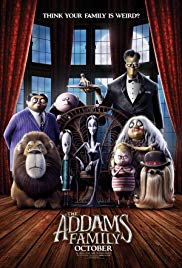
THE ADDAMS FAMILY
US, 2019, 97 minutes, Colour.
Voices of: Oscar Isaac, Charlize Theron, Chloe Grace Moretz, Finn Wlofhard, Nick Kroll, Snoop Dog, Bette Midler, Alison Janney, Martin Short, Catherine O' Hara, Jennifer Lewis.
Directed by Greg Tiernan, Conrad Vernon.
If we thought that the Addams Family had had their day, this entertaining variation on the family will make us think again.
While the original television show was highly stylised, looking like an life-action cartoon, this version is lively animation. And, it has a strong role call of talented actors supplying the voices – who would ever have thought of Charlize Theron as steely commanding Morticia Addams? Oscar Isaac is Gomez and Chloe Grace Moretz voices Wednesday.
Many audiences will still be remembering the feature films with Raoul Julia, Angelica Huston and Cristina Ritchie. And they were enjoyable too.
The opening goes into a bit of back history, the wedding between Gomez and Morticia interrupted by hostile townspeople who cause them to flee. They knock over Lurch who takes them up to the mountaintop asylum – which becomes Home Sweet Home.
As so often, it is Wednesday who causes the problems, going to school, making friends with a young student (whose overwhelming-looking and sounding mother, voiced by Alison Janney, leads the hostile citizens against the Addams Family). Wednesday, always in black, starts to experiment with colour, much to Morticia’s horror. But, in these multicultural times, Wednesday is able to bring some rapport between the Addams and the local townspeople. And, of all things comic, the dominating mother takes a shine to Uncle Fester.
The main characters are all here, Harridan grandma (Bette Midler) arriving to take over, especially for Pugsey’s mazurka ritual. And, Lurch has the opportunity to play quite a number of excerpts from familiar songs, some parodies on horror themes, and, of course introducing the finger snapping theme song.
Mixed reactions to this film – one comment saying it is particularly unfunny, the next, congratulating filmmakers for making such a funny film. It is over to us. This reviewer offers a pleasant thumbs up.
1. The popularity of the original television show, the feature films? The TV show like live-action cartoons? This film in that tradition?
2. The family, the living dead, the ironies and their being considered as monsters?
3. The plots, exaggerations, the characters, satire, humour?
4. The style of animation, the look of the characters, from the television series? Appearances, voices and a strong talent, the musical score, the range of songs? The theme song and the clicking?
5. The opening, the wedding, Gomez and Morticia, the attack of the townspeople, the fleeing, persecuted?
6. On the Road, knocking down Lurch? The asylum on the hill? Going there, transforming the asylum, their home?
7. The range of the members of the family, Gomez short, smiling, Hispanic? Devoted father? Morticia, thin and haughty, superior and commanding? Uncle Fester, the comedy, the bath and Pugsley is tricks? Pugsley, the boy, his coming-of-age? Grandma, harsh, taking over? Loach and the music? It and his hair? Arriving, the photos?
8. Wednesday, her age, severity, in black, going to school, the friendship with Parker, the pier influence, the colour, Morticia’s reaction, her being transformed? Wednesday defying the family?
9. Parker’s mother, her appearance, bombastic, her voice, her control?
10. The transformation of the town, multi-cultural, excepting the Addams Family? Everybody sharing?
11. Parker’s mother, the change of heart, the infatuation with uncle Fester?
12. Pugsley, performance, the family gathered, his success?
13. An animation future for the Addams Family?
Where's My Roy Cohn?
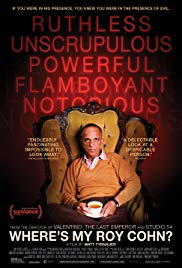
WHERE’S MY ROY COHN
US, 2019, 97 minutes, Colour.
Directed by Matt Tyrnauer.
‘Beyond Macchiavellian’. ‘A man with no boundaries’.
For audiences young enough not to have heard of Roy Cohn, this documentary, firmly critical of him – and beyond - will be something of a revelation. Audiences who know of his history will have the opportunity to go through it, his origins and growing up, the chronology of his legal and political activities, his final disgrace.
Cohn has appeared in a number of films as a character, James Woods portraying him in Citizen Cohn (1992), his being an aide to Sen Joe McCarthy? in Tail Gunner Joe (1977, played by George Wyner), and, a forceful presence, object of disdain, criticised in Tony Kushner’s Angels in America (2003, directed by Mike Nichols) where he is played by Al Pacino.
Born in 1928, Cohn had a law degree by the age of 20 but could not practice until he turned 21. Almost immediately, he was involved in anti-Communist campaigns, the case against Julius and Ethel Rosenberg as spies, saying that he would willingly have pulled the lever himself, then aide to the notorious Senator Joe McCarthy? and the crusade against communists, involved, personally, in having promoted David Schine, a friend (or more) to work with McCarthy? and the hearings against the Army for cover-up of communists. He survived Senator McCarthy’s? exposure and downfall.
The documentary has a great number of talking heads, none of them, even relatives and friends, having good words to say about him. There is criticism of his doting mother, his father pressurising him, his short stature, his absolute aggressiveness and determination to win. Because he lived in a radio and television age, there are plenty of interviews with Cohn that can be drawn on, his self-analysis, his self-promotion, his philosophy of the end justifies any means (even to suggesting that Nixon should have destroyed the tapes and avoided the Watergate crisis).
In the second part of the film, Cohn is lawyer and consigliere to some of the New York Mafia families, defending John Gotti and others, very skilful in getting them off or minimising penalties. There is plenty of footage showing Cohn with the Mafia criminals.
In the first half of the 1980s, he works for Donald Trump and his father, cultivating a great friendship with Donald Trump, photos to prove it as well as television news excerpts. He served as a mentor to the young Trump, guiding him in how to deal with the law, with criticism… And, with the film’s release in 2019, it serves as quite a fierce critique of Donald Trump and his relationship with Cohn, some guilt by association…
Cohn pursued homosexuals in government offices with Senator McCarthy?. The film shows innuendo about his relationship with David Schine. However, Cohn never came out, fielded questions about coming out of the closet, denied that he was suffering from AIDS, which he was, and from which he died.
The cumulative effect of the talking heads and their criticism: is certainly very effective, suggesting to audiences that he was some kind of embodiment of evil, that he was symbolic of what was wrong with American society in the 20th century.
His attitudes and behaviour, in trials, in hearings, in court cases, have to be seen to be believed.
Marianne and Leonard: Words of Love
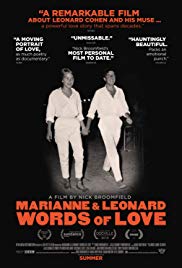
MARIANNE & LEONARD: WORDS OF LOVE
UK, 2019, 102 minutes, Colour.
Directed by Nick Broomfield.
Nick Broomfield is a British documentarist, has been making films for over 40 years, going into trouble spots around the world, focusing on the lives of celebrities including Kurt Cobain, Tupac and Biggie as well as Aileen Wournos.
He is more personally involved in this documentary about Leonard Cohen and his relationship with Marianne Ihren who was something of a muse for him for many decades. Broomfield’s personal interest is that he was on the Greek island of Hydra in 1960 and had a relationship with Marianne, meeting her a number of times over the succeeding decades.
Leonard Cohen lived on the island of Hydra in the first half of the 1960s. He had a relationship with Marianne, a Norwegian with a young son. In many ways the relationship was idyllic. In many ways it was far from idyllic. In fact, so much of this documentary could be considered a Requiem for the permissive past of the 1960s. Cohen was very much in the tradition of sex drugs and rock ‘n’ roll, although his music was hardly rock ‘n’ roll.
Canadian born, a dominating Jewish mother, Cohen began his career by writing poetry and novels. The novels were considered more than esoteric by many reviewers and shunned by readers. For years Cohen also suffered from depression. The idyllic aspects of his relationship with Marianne encouraged him in those years. The film contains excerpts from Cohen himself but also interviews with Marianne, with a number of friends from the Hydra days, from fellow-musician Richard Cornelius, other artists and managers with the opportunity to reconsider the past.
Cohen was tentative in his initial song but received the encouragement of Judy Collins and he moved to going to festivals like that on the Isle of Wight. By the late 1960s, he had become popular with his style of recitative poetry songs.
While disappearing for weeks with depression, Cohen remained in the atmosphere of the freelove ethos of the 1960s. And, yet, he often returned to stay with Marianne, inviting her to all his concerts. She eventually went back to Norway and remarried, concerned about the son from her first husband, influenced strongly by the ethos of freedom in Hydra and spending a lot of time in an institution.
Audiences will be wondering about Hallelujah and sometime is given in the film to Cohen’s going to the Buddhist monastery outside Los Angeles, spending five years there in Zen contemplation and the ordinary tasks around the monastery, leaving in 1999. He then discovered that his manager had embezzled his money but, in 2009, he began performing concerts again, inviting Marianne to his concert in Oslo where she is filmed in the front row.
The many Cohen fans will be interested in this portrait – but for those not so familiar with him or his songs, he does not emerge as an engaging personality.
Jo Jo Rabbit

JOJO RABBIT
UK, 2019, 108 minutes, Colour.
Roman Griffin Davis, Thomasin Mc Kenzie, Scarlett Johansson, Taika Waititi, Sam Rockwell, Rebel Wilson, Alfie Allen, Stephen Merchant, Archie Yates.
Directed by Taika Waititi.
The title, Jo Jo Rabbit, would be intriguing whatever the story. However, this is a story of the Third Reich. And, with this picture of 1944-1945, there is no springtime for Hitler and Germany. Rather, another cinema reference would be Cabaret with the close-up of the enthusiastic, angelic looking boy singing so enthusiastically and the camera drawing back to reveal him as a member of the Hitler Youth.
Jo Jo is 10 years old, the Hitler Youth recruits being younger than before. Roman Griffin Davis, in his first film, is perfect as Jo Jo, acting his age, indoctrinated in Nazi ideology, sharing training with his young fat friend, Yorkie (Archie Yates). Jo Jo lives at home with his mother, Scarlett Johansson, unaware that she is shielding a young Jewish girl, Elsa, Thomasin Mc Kenzie.
The small town they live in comes out of picture books of central Europe. We see the streets, military headquarters, homes – as well as excursions out in the countryside. Jo Jo is part of the training, supervised by an eccentric captain who has lost one eye, played by Sam Rockwell. He has some obsequious enthusiastic and sadistic young officers who demand that Jo Jo kill a Rabbit, twist its neck. He can’t and gets the derogatory nickname.
Jo Jo lives at home with his mother, his father allegedly fighting outside Germany, his sister dead. His mother seems rather eccentric in the town, the way she dresses, her hat, going bike riding with her son. We know that she has to be subversive. Which leads to one of the shocking sequences of the film.
There is quite a lot of parody in the sequences of the military training of the boys – added to by an enthusiastic Rebel Wilson, urging her charges to go and burn some books. There is also comedy with a tall, gaunt Stephen Merchant, dressed in black, arriving with his henchmen, parody repetitions of Heil Hitler on first arrival, then on the arrival of the military captain, then with the emergence of Elsa into the room. Heil Hitlering has never looked so idiotic!
While Jo Jo is only 10, and has no idea of what love is (although his mother talks about the experience of butterflies in the stomach – and this is later to be visualised), his initial suspicion of Elsa turns into an attraction, into care and protection, into love.
But, we have seen the posters. We have seen the trailers. We know that Hitler makes an appearance – and, more than an appearance. And this is a touch of genius from New Zealand’s writer-director, Taika Waititi (who, for almost a decade, has made two fine films focusing on young boys experience, Boy, Hunt for the Wilderpeople, a parody of vampires living in flats in Wellington, What We Do in the Shadows, directing Thor Ragnorak and appearing as the Stone-creature Korg). Adapting a novel by Christine Leuning, Caged Skies, Waitit does Hitler.
Many children have imaginary friends. Jo Jo has Hitler. And, in many ways, Hitler acts and speaks like a 10-year-old, sharing Jo Jo’s enthusiasm, having discussions about the girl in hiding, encouraging Jo Jo in his ideology – but, Jo Jo has to grow up and the imaginary friend, not keeping pace with Jo Jo, has to be kicked out the window: the defenestration of Hitler!
For audiences prone to literal interpretations of what they hear and see, this comic parody might not appeal to their sense of humour. For those with a sense of humour, even for those who have memories of World War II, of the atrocities and racial persecutions, a bit of parody doesn’t do any harm, puts the pretensions of fascists into perspective. Mel Brooks can attest to this.
Charlie Chaplin mimicked Hitler during the war itself in The Great Dictator. Now, 80 years on, mimicry and parody are still effective.
1. The title? The tone? The parody of life during the Third Reich? The satire and mockery? The moral lesson?
2. Audiences looking back 70 years and more, memories of World War II, the Holocaust? Looking back at the serious issues? German history? The experience of the war, of atrocities?
3. The setting here, 1944-1945, the military in the German town, the authorities and their spine, the SS? The youth, the little boys, the training camps? The issues of the sheltering of Jews? Nazi ideology? The allies attacking, the defeat of the Third Reich, of Hitler?
4. The town and its look, middle European, the streets, homes, shops? The countryside out so outside the town?
5. The musical score, the range of songs, the Beatles in German…? Ironic touches?
6. The origins in the novel? The adaptation by the writer-Dir and his performances Hitler? The international cast?
7. Jo Jo, aged 10, an angelic looking young boy, a member of the Hitler youth, his friend and his size, spectacles? Jo Jo and his nickname, the training, the rabbit, his being commanded to bring the rabbits net, his inability to do so? His name? The training with the grenades, his from the grenade, the ricochet, the injuries to his face? Jo Jo, Annie and mouthing the Nazi ideology? Suspicion of the Jews, the Aryan Heritage – and the final comment about the allied Japanese not looking Aryan!
8. The presence of Hitler, younger, his behaviour and talk in manner? His being the equivalent of a child’s imaginary friend? His acting as a 10-year-old, a childish Nazi, his accent, his look, behaviour, happy, sharing with Jo Jo, their discussions, the discussion about the situations, hiding the Jewish girl? His demands on Jo Jo, his petulant sinking the chair? His disappearance for a time? His return, the demands, criticising Jo Jo, on Jo Jo kicking out the window?
9. The family, the absent father, the sister did, the mother, her style, dress and hat, love for her son, the going for rides, the walks? Her talking to Jo Jo, taking in the Jewish girl, not telling Jo Jo? The secrecy, Jo Jo and his disguise and making the appeal in the streets, seeing his mother and her subversive activity? The shock of seeing her hanging?
10. The commander of the youth training, the injury to his eyes, not being able to fight, the demanding soldier, training, the speeches, propaganda, his assistant in the insinuation of a gay glance? Transfer to the office, the jobs, propaganda? Jo Jo and his earnestness, distributing the propaganda? His coming to the house, the head of the SS, the jokes about heiling Hitler! Also pretending to be the dead sister, his shielding her about the date of her birth? The waging of the war, the flamboyant costumes, his being wounded? His finally saving Jo Jo and urging him to escape?
11. The female assistant? Rebel Wilson comedy, with the boys, in the office, wanting to burn the books, the final attack?
12. Jo Jo’s young friend, supporting him, succeeding, meeting up at the end, the explosion for the shop? Not a good time to be a Nazi!
13. The SS, Stephen merchant and his appearance, the salutes, the search, the book about the Jews, also pretending to be anger, his assistance?
14. The young trainers, their fanaticism, the bringing of the neck of the rabbit? Eventually in the war?
15. Elsa, Jo Jo discovering her hidden, relationship with Nathan, her love for real, Jo Jo and his suspicions, the change of heart, the letters pretending to be those from Nathan, the poetic quotes? The revelation of the truth about his death? Jo Jo deciding to save her, her appearing with the SS and pretending to be the sister? Jo Jo in love? The visuals of the butterflies in his stomach?
16. The end of the war, the planes flying over, the bombs, the ruins, the people in the bewilderment?
17. Jo Jo and his live about Germany winning the war, Elsa believing him, eventually bringing her outside, the slapping him? And the idea that at the end of the war, there would be dance?
18. Hitler, Jo Jo not having any need for an imaginary friend, the confrontation, the defib the station?
19. The effect on the audience of this kind of parody and its anti-fascist message?
Farmageddon

FARMAGEDDON: A SHAUN OF THE SHEEP MOVIE
UK, 2019, 86 minutes, Colour.
Voices of: Justin Fletcher, John Sparkes, Chris Morrell, Andy Nyman, Kate Harbour.
Directed by Will Becher, Richard Phelan.
Do you enjoy Shaun the Sheep? He is Aardman Studios gift to younger audiences – but not excluding older audiences. Shaun first appeared alongside those favourite Aardman Studios characters (Britain’s gift to the world of cinema animation), Wallace and Gromit. He then had his own television series and, several years ago, his first feature film. Here he is again.
Shaun lives at Mossy Bottom Farm along with the rest of the sheep. They seem to have a happy life although they frequently get up to mischief, especially Shaun, and are continually under the disciplinary scrutiny of the farm dog, Bitzer Bitzer is into restrictions, putting up forbidding signs all over the place. The farmer is preoccupied with his tractor. So, the setting is familiar. However, the Aardman writers must have a very soft spot for ET. So many of the younger audiences will have seen ET who, in fact, it is almost 40 years old) and will recognise the story of a spaceship arriving on earth (a mini Close Encounter) and an attractive little creature, Lu- La, is stranded on earth, and, of course, wants to go home.
Shaun discovers Lu- La, who has a penchant for pizza, and so begins a whole lot of comic adventures. This is not a comedy of words but of situations, suggestions, hums and has, gestures. After some initial hesitation, Bitzer, of course, will do his bit to help things along. The farmer is more practical and pragmatic and decides to turn his property into a theme park, with the enjoyable title Farmageddon. It is, of course, not quite the end of the world.
But, it could be for Lu- La. A government agent, severe in appearance and attitude, Miss Red, with her assistant robot, is determined, more than determined, to hunt down the alien. It seemed she had some unpleasant experiences in her childhood with another close encounter a relentless mission.
Comedy, adventures, dangers in the theme park, rescues, Lu- La’s parents, plenty of ingredients to keep a young audience very happy – not to forget some mayhem in a supermarket. Some travel in space.
But, what about the adults, especially those who have fond memories of Wallace and Gromit? There are enough sight gags throughout the film to make it enjoyable. There are plenty of references to other movies and science-fiction themes. While the children might be laughing out loud, many parents and grandparents will be having a gleeful chuckle.
1. The popularity of Shaun the Sheep, television series, movies? The target audience, children, adults? Audience familiarity with Sean and his activities?
2. Aardman Studios, their claymation style, stop motion photography? The range of characters, movement, layouts? The musical score?
3. Mossy Bottom, the farm, the sheep, Bitzer and his discipline, his demanding notices and forbidding activities? The farmer, preoccupation with his tractor? The background of the town? The supermarket scene? Entertainment at the fair?
4. The close encounter background, the ET style character? A tale for children? The adults picking up all the references to science fiction films, jokes?
5. The humorous characters, situations, communicating by sound and action rather than words? Humour for children? Chuckles for adults?
6. The farm, the sheep, forming a community, Shaun and his role, his character, the activities? Bitzer, his character, discipline, notices, intervening?
7. The close encounter, the ET character?
8. Audiences familiar with close encounter stories, the landing of the space ship, the little creature lost, the food, the attraction to pizza, Shaun and his care? Bonding? The response of the sheep?
9. The authorities, the agent, Red, the story of her past and close encounters? Her mission, determination, activities? The robot assistant?
10. The farmer, the tractor, finding the creature, his idea, commercial, setting up Farmageddon? The money?
11. Bitzer, bonding with Shaun, the help? Going inside the space ship, the probe?
12. The supermarket scene and the mayhem, excitement at the fair?
13. Lu- La, character, the parents, signals, bonding with Shaun, the fair? The space ship, inside? The departure?
14. The happy ending, the creature return into space, life resuming at Mossy Bottom?
Telle Mere, Telle Fille/ Like Mother, Like Daughter/ Baby Bumps
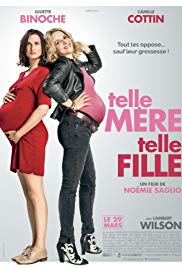
TELLE MERE, TELLE FILLE/ LIKE MOTHER, LIKE DAUGHTER/BABY BUMP(S)
France, 2017, 94 minutes, Colour.
Juliette Binoche, Camille Cottin, Lambert Wilson, Catherine Jacob, Jean-Luc? Bideau, Michael Dichter.
Directed by Noemie Saglio.
Juliette Binoche has had a varied and interesting career, a wide range of different roles, working in English-language films as well as in her own French language. This is one of her lighter roles.
Her daughter, Avril, played by Camille Wanting, is very serious, works at a cheerful and laboratory (commission to make a scent for lavatories), supporting her thesis-writing husband. They are pregnant. Her mother, Mado, who lives with them, is carefree and irresponsible, divorced long since from her husband, Marc, an orchestra conductor (Lambert Wilson).
After the announcement of the pregnancy to the husband’s parents, Mado and Marc spend time together – leading to her pregnancy.
So, a comedy of conflicts, the daughter wanting the mother to have an abortion, the mother wanting the daughter to have an abortion. In fact, of course, neither have an abortion and there is a great affirmation of pregnancy, giving birth, the love for children.
There is a lot of comedy of circumstances, hiding the truth, revelations, but, finally a happy photo of mothers and fathers and children.
1. A family film with the light touch?
2. The title, expectations? Marriage, pregnancy? Age and pregnancy? Issues of abortion? Issues of bearing children? The joy in children?
3. The Paris settings, Avril and her work, perfumes? Louis and his thesis? Mado, carefree, irresponsible, living with her daughter, memories of her own reactions to her mother? Setting the scene?
4. At home, Avril and her seriousness, supporting Louis, supporting her mother, taking responsibility for her mother, the pregnancy, the dinner to announce it, Mado and Marc pretending? Louis’ parents? The aftermath, Marc and Mado together, reminiscences about their life, the separation, his music, travels, the audience seeing him with the orchestra, performance and rehearsal? The sexual encounter, the consequences?
5. Juliet Binoche and her comic turn as Mado? Out on the town, drinking, her appearance, her love of dancing, her career, carrying for her daughter? Living with her daughter, the shopping, forcing her to buy clothes? At home, memories of her marriage?
6. The turn, discussions with her friends, the gym, the doctor, pregnant? Avril at work, leaving, her reaction, wanting the abortion? The visit to the doctor, his vagueness – and his death and funeral? His son and the medical help? The discussion about the abortion, the pills? Mado and her reaction, the decision to have the baby?
7. Marc, the visits, Mado hiding from Avril? His paternity? The decision for secrets?
8. The progress of the pregnancies, scans, joy? Marc and Mado, her opting not to pretend? Announcing her pregnancy?
9. Avril, her co-worker, the bosses, the lavatory scent, the stink, her protesting, losing her job?
10. The discussions with her father, going out on the town, letting her hair down, the exhilaration, the effect of seeing her boss at home, the children and an ordinary life?
11. The births, the children – the final gathering of everyone, the happy ending and photo?
Final Score
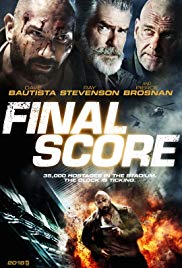
FINAL SCORE
UK, 2018, 104 minutes, Colour.
Dave Bautista, Pierce Brosnan, Ray Stevenson, Ralph Brown, Amit Shah, Lara Peake.
Directed by Scott Mann.
Final Score is an ambiguous title. It could be the result of conflict. It could be the result at the end of a sports match. Here, it is both.
This is a film of action with some touches of brutality. It is far-fetched but that is one of the points being made in this kind of action drama (somewhat reminiscent of Jean-Claude? van Damme and Sudden Death, also in a sports stadium).
The politics is introduced, a revolution in Russia, the defeat of the leader, the aftermath 17 years later, brutal thugs, a search for the original revolutionary who is not dead but his living in London (in the form of Pierce Brosnan).
This is an action film for Dave Bautista as Mike, big, helping, a former mercenary, yet softhearted for his niece. This is important as he has bought her tickets to a grand final at West Ham but she gives him the slip. As he goes to search for her, helped by one of the security guards, a good comic turn from Amit Shah, he becomes involved in an extraordinary plot to get back the initial leader who is at the match, bring him back to his homeland to lead the revolution again.
At first, Mike thinks it is just an opportunity to find out where his niece is. This leads to thug security guards, fights, deaths, the unfolding of an enormous plan, computer-controlled, to lock the stadium, to hold the fans as hostage until the leader is found and taken back to Moscow. With Mike discovering something of the truth, the British police are called in, SAS is prepared, an international intervention is discovered… And so, the action is a great deal of fighting, trying to prevent explosions and deaths, motor bike riding, huge leaps… Issues of self-sacrifice. But, the final score is a victory for Mike and law and order as well as family.
1. The title? Sports? Politics?
2. The London setting, homes, streets, West Ham, the football stadium, interiors, pitch, stands, control rooms, corridors…? The insertion of the football play sequences? Musical score?
3. The opening, revolutions, Russia, suppression of the revolutions, the death of the leader, the assertion of his brother? The brutality? 17 years later, the thugs, pursuit, torture? The transition to the UK?
4. Mike, his background, soldier, his squad, losing the men, his best friend? Coming to London, the taxi, meeting Danni and her mother, the memories of the past, Danni, 15, playing up, her mother grounding her? The West Ham tickets? Her mother relenting?
5. The crowd is going to the match, the atmosphere, the media, commentators? Danni, with Mike, suddenly sad about her father’s death in action, the encounter with the boyfriend? Mike going to buy the hot dogs, Danni going with the boyfriend? Mike and his concern – leading to all the drama and melodrama in order to find her?
6. Mike, his character, tough, softhearted? The encounter with Faisal? Faisal and the prejudiced lady (and finally rescuing her)? His job, the encounter with Mike, going with him, trying to reach the control? The guard, the violence, his death? Faisal going down in the dumbwaiter? Mike and his continued search? The dangers, with Danni, the violence with Tatiana?
7. The Russians, the leader with the computer, the brother and his demands, the squad, Tatiana and her vengeance and viciousness? Setting up, the explosives and the extent? The control of radio and communication? Locking the stadium?
8. The purpose, the revelation that the leader was still alive, had betrayed, was in disguise, protected by the British? To capture him, keep him alive, start the revolution again? The prospect of failure, the explosives and the consequent deaths?
9. Mike, the contact with the police chief, at the concert, not believing him, the truth being confirmed, coming to the site, the police, the international intervention, the helicopter, the SAS ready? Dilemmas and decisions?
10. Mike, his continued search, confronting the thugs in the kitchen, Tatiana? Discovering the explosives? Contact with Faisal, searching for Danni, her being with the boyfriend and leaving him? Her being a possible hostage?
11. The increased activity, the people in the stadium not knowing the truth, the broadcast to the outside world, crowds outside? The details of the action, the fights, the motor bikes, leaps across roofs, falls? The taking of the leader? His collaboration? The plan with the helicopter, Danni and her wanting to self-sacrifice? Mike disguising himself, the further fights? The force television material? The explosions, the panic? The escapes?
12. The Russian, his disguise, dialogue with his brother, his sacrificing himself and defeating the cause?
13. However implausible, an action entertainment?